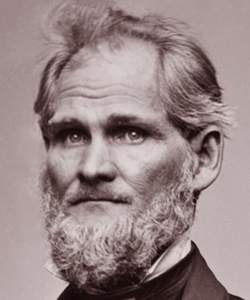Henry Smith Lane (Congressional Biographical Directory)
Reference
LANE, Henry Smith, a Representative and a Senator from Indiana; born near Sharpsburg, Bath County, Ky., February 24, 1811; received a classical education from private tutors; studied law; admitted to the bar in Mount Sterling, Ky., in 1832 and commenced practice at Crawfordsville, Ind., in 1834; member, State senate 1837; member, State house of representatives 1838-1839; elected as a Whig to the Twenty-sixth Congress to fill the vacancy caused by the resignation of Tilghman A. Howard; reelected to the Twenty-seventh Congress and served from August 3, 1840, to March 3, 1843; served in the Mexican War at the head of a company he had raised; rose to lieutenant colonel of the First Indiana Regiment; abandoned the profession of law and engaged in the banking business at Crawfordsville, Ind., in 1854; elected Governor of Indiana in 1860; was inaugurated January 14, 1861, and served just two days, when, by previous arrangement, he was elected to the Senate; elected as a Republican to the United States Senate and served from March 4, 1861, to March 3, 1867; chairman, Committee on Engrossed Bills (Thirty-seventh through Thirty-ninth Congresses), Committee on Pensions (Thirty-ninth Congress); served as special Indian commissioner 1869-1871; commissioner for improvement of the Mississippi River in 1872; died in Crawfordsville, Ind., June 18, 1881; interment in Oak Hill Cemetery.
"Lane, Henry Smith," Biographical Directory of the United States Congress, 1774 to Present, http://bioguide.congress.gov/scripts/biodisplay.pl?index=L000060.
Henry Smith Lane (American National Biography)
Scholarship
Although not an officeholder during the 1850s, Lane's forceful stump speaking and moderate views had made him a major Whig leader in Indiana, and he powerfully affected the creation and success of the Republican party. Although he favored liquor prohibition and a citizenship requirement for voting, Lane was primarily concerned with the interrelated national issues of slavery, economic development, and territories. Thus, he spurned the American (or Know Nothing) party, and he was a leader at the 13 July 1854 meeting that started the People's party. Lane's prominence grew in 1856 when he chaired both the state and national Republican conventions. Although his rough, emotional style did not impress certain easterners at the national convention, he articulated a clear moderate position on slavery, strongly opposing the extension of slavery into the territories, while vigorously rejecting the label of abolitionist.
Philip R. VanderMeer, "Lane, Henry Smith," American National Biography Online, February 2000, http://www.anb.org/articles/04/04-00611.html.



